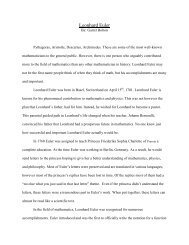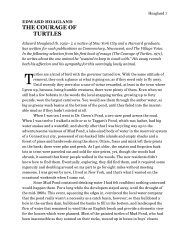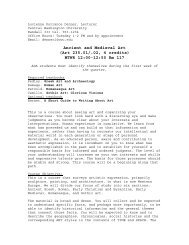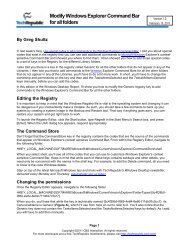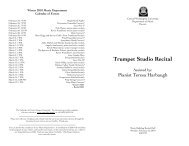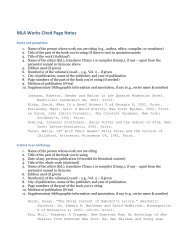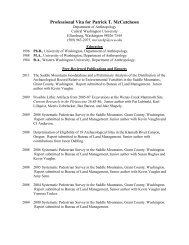The Ingenious Gentleman Don Quixote de la Mancha
The Ingenious Gentleman Don Quixote de la Mancha
The Ingenious Gentleman Don Quixote de la Mancha
Create successful ePaper yourself
Turn your PDF publications into a flip-book with our unique Google optimized e-Paper software.
<strong>Don</strong> <strong>Quixote</strong> <strong>de</strong> <strong>la</strong> <strong>Mancha</strong> 5 <br />
<br />
thinking, lofty, sonorous, and significant of his condition as a hack 6 before he <br />
became what he now was, the first and foremost of all the hacks in the world. <br />
<br />
Having got a name for his horse so much to his taste, he was anxious to get one for <br />
himself, and he was eight days more pon<strong>de</strong>ring over this point, till at <strong>la</strong>st he ma<strong>de</strong> <br />
up his mind to call himself "<strong>Don</strong> <strong>Quixote</strong>," whence, as has been already said, the <br />
authors of this veracious history have inferred that his name must have been <br />
beyond a doubt Quixada, and not Quesada as others would have it. Recollecting, <br />
however, that the valiant Amadis was not content to call himself curtly Amadis and <br />
nothing more, but ad<strong>de</strong>d the name of his kingdom and country to make it famous, <br />
and called himself Amadis of Gaul, he, like a good knight, resolved to add on the <br />
name of his, and to style himself <strong>Don</strong> <strong>Quixote</strong> of La <strong>Mancha</strong>, whereby, he consi<strong>de</strong>red, <br />
he <strong>de</strong>scribed accurately his origin and country, and did honor to it in taking his <br />
surname from it. <br />
<br />
So then, his armor being furbished, his morion turned into a helmet, his hack <br />
christened, and he himself confirmed, he came to the conclusion that nothing more <br />
was nee<strong>de</strong>d now but to look out for a <strong>la</strong>dy to be in love with; for a knight‐errant <br />
without love was like a tree without leaves or fruit, or a body without a soul. As he <br />
said to himself, "If, for my sins, or by my good fortune, I come across some giant <br />
hereabouts, a common occurrence with knights‐errant, and overthrow him in one <br />
ons<strong>la</strong>ught, or cleave him asun<strong>de</strong>r to the waist, or, in short, vanquish and subdue him, <br />
will it not be well to have some one I may send him to as a present, that he may <br />
come in and fall on his knees before my sweet <strong>la</strong>dy, and in a humble, submissive <br />
voice say, 'I am the giant Caraculiambro, lord of the is<strong>la</strong>nd of Malindrania, <br />
vanquished in single combat by the never sufficiently extolled knight <strong>Don</strong> <strong>Quixote</strong> of <br />
La <strong>Mancha</strong>, who has comman<strong>de</strong>d me to present myself before your Grace, that your <br />
Highness dispose of me at your pleasure'?" Oh, how our good gentleman enjoyed the <br />
<strong>de</strong>livery of this speech, especially when he had thought of some one to call his Lady! <br />
<br />
6 A nag; in Spanish, a rocin.







